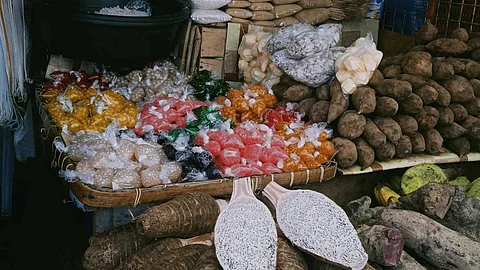

IN THE lively streets of Carbon Market, Cebu City, lies a treasure trove of flavors and stories, where vendors like Jacqueline Dahoya and Bebe Andayop make the magic of making binignit happen by providing the ingredients needed for the Filipino delicacy.
In an interview with SunStar Cebu last March 13, they revealed the essential ingredients that compose the Filipino dessert binignit.
This dessert embodies the warmth of Filipino hospitality and the richness of local ingredients. However, behind its delightful aspects lies the challenge of ingredient selection and pricing, as revealed by the market vendors.
Dahoya shared the important ingredients that define binignit’s identity: sago (tapioca pearl), kamote (sweet potato), landang (palm flour jelly balls), pilit (sticky rice), lubi (coconut milk) and gabi (taro). From the fluffy texture of sago to the creamy coconut milk, each ingredient plays a vital role in shaping the character of binignit.
As she gestured towards her stall, laden with sago in plastic wrapper, she shared insights on the pricing dynamics—from “singko kada usa ka putos” for sago (P5 per small wrap of tapioca pearl) to the changeable rates for other ingredients like kamote and most especially taro, as she added, “Nihit ang gabi (taro) ron,” indicating the scarcity of supply for taro.
But when asked for the usual price it’s sold for, she replied, “Kasagaran P120, pero ambot karon. Basin demand ba kai nihit man jud siya.” (Usually P120, but I don’t know about now. Demand might raise the price because it’s really scarce.)
Interviewed when the Holy Week celebration was still approaching, Dahoya hinted at the possibility of rising prices, emphasizing the importance of strategic planning amid market dynamics.
According to Dahoya, “Oo, naay possibility nga motaas gyud ang presyo. Yes! Sayo pa man ron. Ang Holy Week is 28 to 29 (of March).”
(Yes, there’s a possibility that prices will rise. It’s still early. Holy Week is still March 28 to 29.)
March 28 and 29 mark Holy Thursday and Good Friday within the Holy Week celebration during which the demand for binignit is high as it does not contain meat. Catholics abstain from eating meat on the Fridays of Lent.
She said she spent an initial P20,000 for her supply of binignit ingredients.
Dahoya said before Holy Week, market officers gathered the vendors to a meeting to ensure that they follow rules and regulations on fair pricing.
“Oo, naa gyud. I meeting jud mi, aron ma organized gyud mi ba. Ang nagkupot man gyud namo ani diri, Ma’am, is market. Sila’y naghandle namo ari para ma organized. Way lagbaw, para level lang ang price,” Dahoya said of the market officials that handle their contracts and release the prices at which the vendors should sell their goods.
Central to Dahoya’s success is her partnership with market authorities, who work tirelessly to maintain fairness and integrity within the marketplace.
Through open conferences and collaborative efforts, vendors and authorities strive to uphold standards of transparency and accountability, ensuring a level playing field for all stakeholders involved.
Bebe Andayop, also a seasoned vendor, echoed Dahoya’s sentiments while sharing her own sourcing journey.
From gabi to langka, each ingredient carries a tale of partnership since these crops come from the farmers.
Beyond the lively Carbon Market lies a narrative of persistence, cooperation and integrity.
Through the scope of Jacqueline Dahoya, Bebe Andayop and the Carbon Market Office, the journey of binignit ingredients emerges as a testament to the enduring spirit of Filipino culinary heritage.
Amid the Holy Week, Carbon Market stands as a beacon of community and commerce, where each ingredient tells a story and every sale embodies heritage.
On Tuesday, March 26, 2024, the prices of the binignit ingredients were the following: lubi (coconut), P20 or P30 each; landang (palm flour white), P240; landang (palm flour pink), P220; banana cardava, P25-P40 per kilogram; purple sweet potato, P50 per kilo; white sweet potato, P50 per kilo; orange sweet potato, P50 per kilo; and the tapioca pearl, three small packs at P20; and gabi (taro), P80-P100 per kilo.
White sugar was P80 to P90 per kilogram; brown sugar, P70 to P90 per kilo; pilit (sticky rice), P60 per kilo; muscovado sugar, P90-P95 per kilo; and ube (purple yam), P100 per kilo. / Jhanneca Mondelo, BiPSU Intern